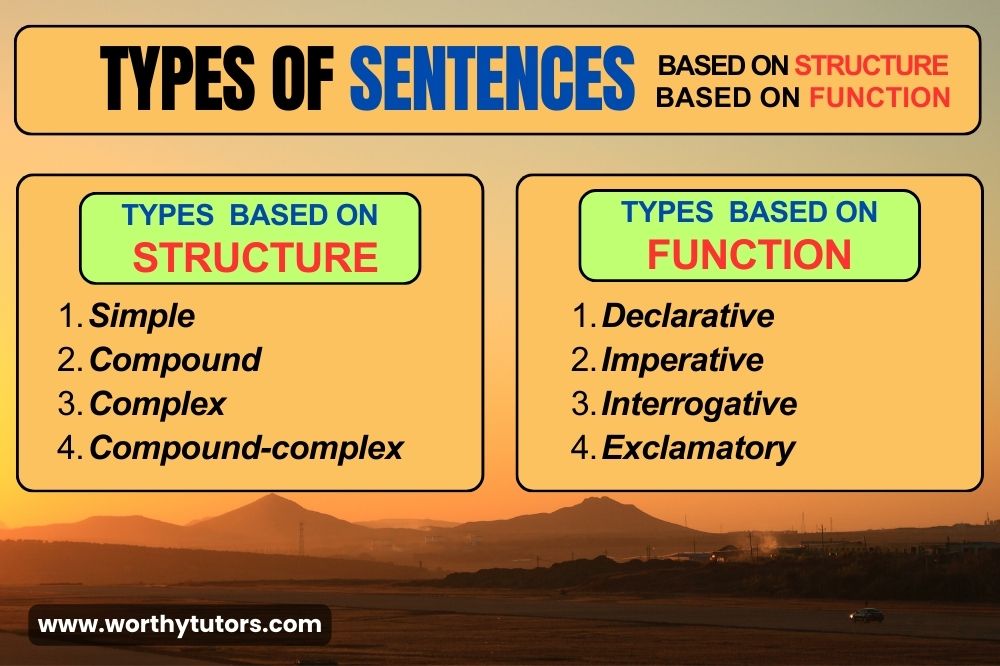
What is a Sentence?
A sentence, at its core, is a collection of words expressing a complete thought. It may take the form of a single word, a phrase, or a combination of words and phrases. Sentences are diverse and fall into four primary types: assertive, interrogative, imperative, or exclamatory. The fundamental rule is that a sentence always commences with a capital letter and concludes with a punctuation mark, the choice of which depends on the sentence’s function.
Examples:
- His laughter echoed joy through the forest. (Assertive)
- Will the sun rise tomorrow? (Interrogative)
- Gather ’round the bonfire. (Imperative)
- What an astonishing display of colors! (Exclamatory)
Structure of a Sentence:
Typically, a sentence comprises a subject, a verb, and an object, following the format:
Subject + Verb + Object.
While a sentence can exist without an object or subject, a verb must be present, as it is considered the heart of a sentence.
Examples:
- Play football. (Here, the subject is hidden, but the verb (play) and object (football) are present in the sentence.)
- Ali plays football. (Here, the subject (Ali), verb (play), and object (football) are present.)
- Ali play. (Here, the subject (Ali) and verb (play) are present, but the object is missing.)
Types of Sentences Based on Structure:
We divide sentences into four types based on their structure: simple, compound, complex, and compound-complex.
Simple Sentence:
A simple sentence contains a single independent clause (a single verb) and does not depend on other clauses.
Examples of Simple sentences:
- The river meandered through the meadow.
- Her laughter echoed through the mountains.
Compound Sentence:
A compound sentence comprises more than one independent clause with no dependent clauses, connected by conjunctions or linkers.
Examples of Compound Sentences:
- She danced through the storm, finding joy.
- The stars glittered, and the moon cast its glow.
Complex Sentence:
A complex sentence has more than one clause, with one being an independent clause and the other a dependent clause.
Examples of Complex Sentences:
- Although her room was cool, she switched on the fan.
- I was getting late therefore I was driving my car very fast.
Compound-Complex Sentence:
Compound-complex sentences combine features of both complex and compound sentences, containing at least two independent clauses and one dependent clause.
Examples of Compound-comples Sentences:
- Though the storm raged, they found solace, and the night unfolded with tales.
- In the jungle, where danger lurked, the explorer ventured forth, discovering treasures.
Types of Sentences Based on Function:
Declarative Sentence:
A declarative sentence, also known as assertive sentence, states information, facts, opinions, or descriptions. All declarative sentences end with a period/full stop.
Examples of Declarative Sentences:
- A car has for wheels. (Passing an information)
- The earth revolves around the sun. (Describing a fact)
- I want to visit ancient castle. (Showing feelings)
- She believes in the magic of destiny. (Providing description of a character)
Imperative Sentence:
Imperative sentences make requests, give advice, directions, or commands, and may end with an exclamation mark or a full stop.
Examples of Imperative Sentences:
- Gaze upon the horizon and let your dreams soar.
- Pass the torch to the next generation; let wisdom guide.
Interrogative Sentence:
Interrogative sentences pose questions. These sentences must end with a question mark.
Examples of Interogative Sentences:
- Have you danced in the rain?
- Why does the moon hide behind the clouds?
Exclamatory Sentence:
Exclamatory sentences convey strong emotions. These sentences have their own punctuation mark and do not end with period. These sentences convey emotions like sorrow, wonder, joy, or anger.
Examples of Exclamatory Sentences:
- What a mesmerizing sunset!
- Oh my luck!